- What do they use for money in Germany? See here
- How do I get money for Germany? See here
- Should I buy Euro to take with me to Germany? See here
- How do you protect your money in Germany? See here
Since January 1, 2002, Germany, along with most of western Europe, has used the Euro. The Euro is based on the numbers 1, 2, and 5, or if you prefer, 5, 2, and 1. There are 500, 200, and 100 Euro notes, although I have never seen a bigger one than a 100. There are also 50, 20, 10, and 5. The bills are graduated in size; 5 Euro is small, 100 Euro is larger. Below are some examples of Euro notes. (I didn't have a 20 when I took this picture).
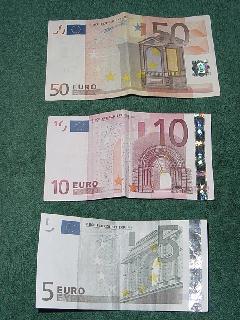
Below Ä5, there are coins. It is important that you learn how to recognize and use the coins. The tendency for Americans is to just use the bills, because they are easy to recognize. After a while the coins piles up. Itís easy to have a couple of 2 Euro coins and a 1 in your pocket. Thatís Ä5, and you should use that instead of giving them a Ä5 note.
Here are the 1 and 2 Euro coins. Iíve shown them along with the 50 cent coin to show that the sizes are very close. The Ä1 and Ä2 coins are clearly marked with 1 and 2. They are also two toned, i.e., silver and brass colored bands.
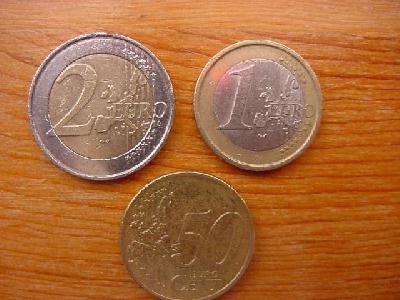 | 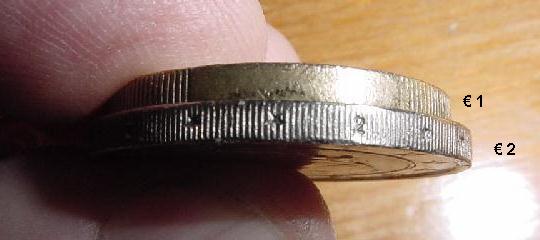 |
| The €2 coin is milled all around the circumference, like our quarters. The €1 coin is intermittantly milled. |
The 50, 20, and 10 cent coins are brass colored.
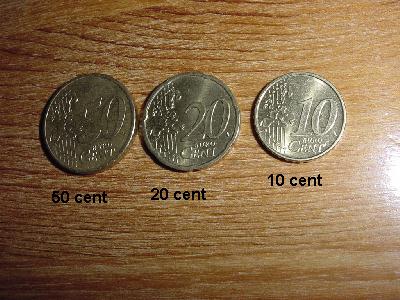 | 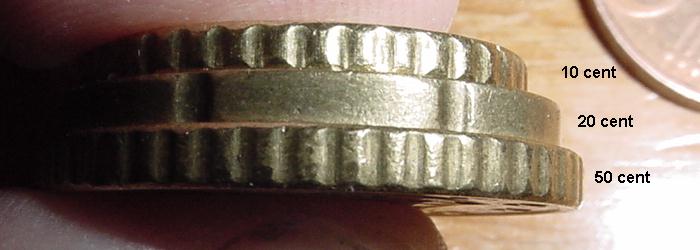 |
| The 50 and 10 have continuous knotches; the 20 has fewer (7), widely spaced knotches. |
The 5, 2, and 1 cent coins are copper colored.
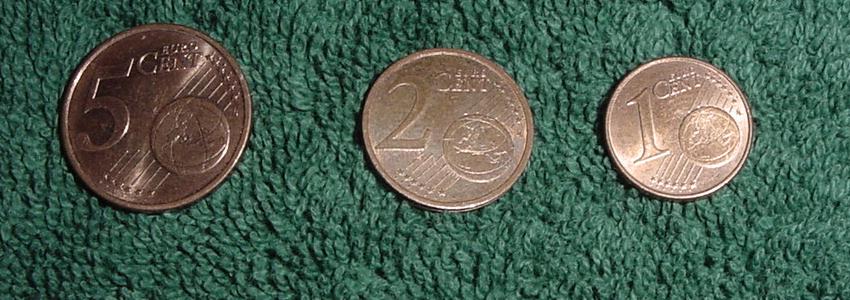 |
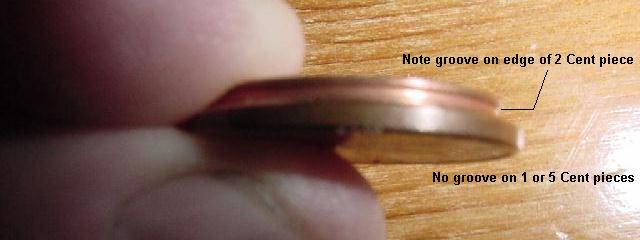 |
Getting cash
Getting cash in Germany is about the same as in the U.S. You use the ATM. ATMs are probably as common in Germany as they are in the U.S. The big difference between ATMs in Germany and ATMs in the U.S. is that in Germany you don't get a printed receipt. That was a little unnerving to me at first.
First, a word about using plastic in Germany. Transactions over there, paying the merchant or ATM owner in Europe and billing your bank in the U.S., are handled by something called the "Network". This is Visa, MasterCard, Plus, Cirrus, etc. They pay the merchant or ATM owner in Euro and collect from your U.S. bank in US$. This is called a "cross border transaction", and for that the network gets about ½%. The Network also gets another ½% for converting the currency. Some "enterprising" U.S. banks (Chase, Wells Fargo, U.S. Bank, et al), who already have international currency operations, pay the network in Euro, thus avoiding the ½% Network currency conversion fee and then charge you their own 3% currency conversion fee. You can avoid this by dealing only with small, local banks, without international currency operations.
Always notify your bank(s) that you are going to be in Europe. They have a tendency to reject transactions from Europe if they don't know you are going to be there. It might be a good idea to look at you maximum daily withdrawl amount at the same time. You might want to up it to avoid frequent trips to the ATM.
Taking cash with you
Some people will tell you not to buy Euro in advance to take with you; expect to get it from an ATM when you arrive. I never buy Euro before a trip, because I always have Ä100-200 that I brought back from my last trip. However, if I didn't, I would definitely get some before going over.
It's not that I worry about a small probability of the ATMs, or my cards, not working when I arrive, it's the consequences if they don't. Imagine being 5000 miles from home and the ATM says "Call your bank" (a long distance call, with foreign operators and unfamiliar phones, and it's 2 AM at home. And, until you resolve the situation, you have no money for food, accommodations, or maybe train tickets (some ticket machines only take cash or European credit cards).
Protecting your money in Germany
Unlike some southern European countries, where pickpocketing is the major source of income for a large portion of the population, the Germans have a strong moral standard, and I don't worry about being pickpocketed in Germany. However, I still keep my passport, cash, and cards in a neck pouch. It's not the probability of having it stolen that worries me, it's the consequences.